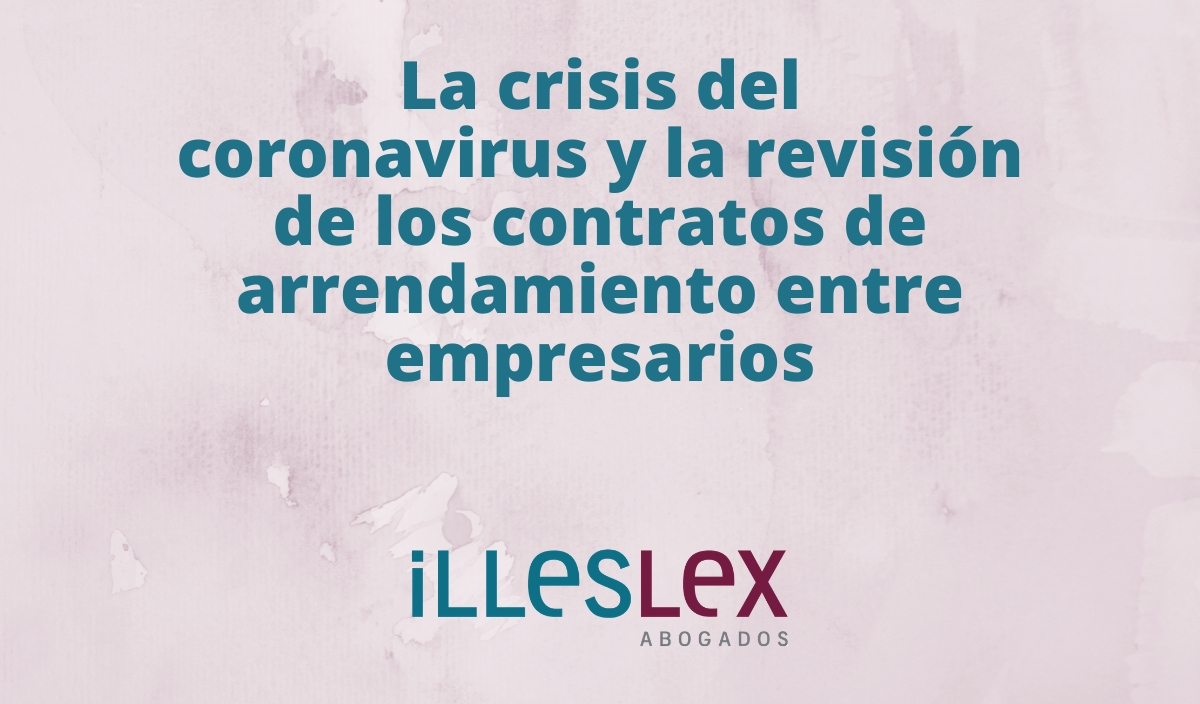
As a result of the crisis caused by the coronavirus that has resulted in a worldwide pandemic, at Illeslex Abogados as experts in real estate law in Mallorca we consider from a legal point of view to what extent this situation may allow the lessee of a hotel or of a ship propose to the lessor a substantial modification of the rent of the contract or even its resolution due to force majeure.
We are going to answer this question in a synthetic way, looking for practical solutions to this situation that is going to be very normal in praxis.
First of all, we must start from the legal principle that contracts must be fulfilled on their own terms. In other words, the parties, having concluded the contract, must respect the content of the contract signed.
However, it is clear that there can be cases of force majeure, such as the one we are dealing with, which is covered by our CIVIL CODE in article 1105. It's obvious that the pandemic that's hitting us is a case of force majeure.
In contrast, in cases where the lease contract provides for the contractual allocation of risks arising from force majeure between the two parties, the contractual provisions must be complied with.
However, it is normal that nothing has been agreed and therefore the question arises to what extent the tenant can be exempted from paying rent as a result of force majeure. And the answer from our side is that the concurrence of force majeure does not exempt the tenant from the payment of the rent but it does exempt him from the payment of compensations and/or penalties for the damages that could be derived from the non-payment of the rent.
It is a different matter if the lessee can consider terminating the contract by mutual agreement or withdrawing from it, respecting, if necessary, the notice contractually fixed, arguing that force majeure prevents continuing with the contract, and therefore the termination of the contract would be justified, without the lessor having the right to demand compensation for damages, precisely as a consequence of the occurrence of force majeure.
At this point, it is necessary to go a step further and ask whether, apart from force majeure, there is any other legal instrument for the tenant to ‘survive' the situation we are now experiencing, and the answer is yes. This is the ‘REBUS sic Stantibus' institute, which has been accepted both by doctrine and by jurisprudence and which would be translated as something similar to ‘things being as they are'.
This institute allows to restore the balance of the services that the parties agreed to when signing the contract but that due to extraordinary and unforeseeable events, in our case the CORONAVIRUS, has been seriously affected or altered. It is a clause based on good faith that must govern contractual relations as recalled in Articles 7 and 1258 and on equity, Article 3, all of the Civil Code.
Therefore, in view of this institute, the lessee could both propose a modification of the contract to correct the excessive imbalance of assets between the two parties, and withdraw, terminate or extinguish the contract when the balance of benefits cannot be remedied by a modification of the contract.
In view of this, lessors and tenants are invited to negotiate in search of an agreement that reasonably satisfies both parties, all inspired by the principle of party autonomy.
In practice, there are several options that can be combined in any way the parties deem appropriate: extension of the agreed deadlines for compliance, temporary suspension of payment of rent, nominal adjustment of rent, partial or total remission of rent, deferment of payment of rent. The key is to negotiate and avoid lawsuits that will only lead to more costs and will certainly not prove either party right.
The question is, why wait for a judge to decide whether the two parties can resolve their differences and adapt to new circumstances and thereby redirect the tenancy relationship immediately?
The answer is clear: it is not a good decision; NEGOTIATING is always better than a good lawsuit.
Javier Blas
ILLESLEX
For additional information about the content of this document, please contact ILLESLEX at info@illeslex.com
©2020 ILLESLEX
ll rights reserved.
This document is a compilation of legal information prepared by ILLESLEX. The information or comments contained therein do not constitute legal advice.
The intellectual property rights on this document are owned by ILLESLEX.
The reproduction in any medium as well as the distribution, assignment and any other type of use of this document, either in its entirety or in an excerpt, is prohibited without the prior authorization of ILLESLEX.
08-ene-2024 / ARTICULO
No suggestions to improve the service. It has been fantastic. The Lawyers have done a great job and we have appreciated their support in some of the issues we have had after the purchase. We would very happy recommend ILLESLEX to other UK clients.
2015-06-04
Very happy with the service.
2015-02-13
Very helpful.
2014-09-10